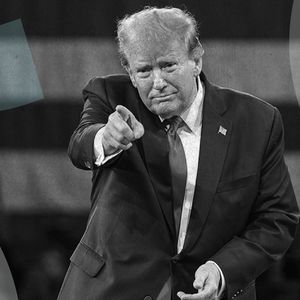Can Brian Quintenz steer CFTC’s crypto future without bias? Will his a16z and Kalshi ties raise red flags as the Senate reviews his nomination? Table of Contents Brian Quintenz faces Senate for CFTC chair role Quintenz’s career and blockchain expertise CFTC peers back Quintenz for chair role CFTC prepares for digital assets oversight Brian Quintenz faces Senate for CFTC chair role Brian Quintenz , President Donald Trump ’s nominee to chair the U.S. Commodity Futures Trading Commission, is scheduled to appear before the Senate on Jun. 10 as lawmakers assess his qualifications to lead an agency preparing for expanded oversight of cryptocurrency markets. The CFTC is currently operating with only two Senate-confirmed commissioners. Rostin Behnam stepped down in February, followed by the departures of Summer Mersinger and Christy Goldsmith Romero by May 31. Acting Chair Caroline Pham is also expected to exit once Quintenz is confirmed, leaving the agency at a pivotal moment with both leadership structure and regulatory direction in transition. Quintenz’s nomination has already drawn attention due to financial disclosures submitted on May 25. The filings reveal he holds $3.4 million in assets, including investments in multiple Andreessen Horowitz crypto funds — CNK Fund III, CNK Seed 1 Fund, and CNK IV Fund — as well as stock options in Kalshi , a prediction market platform where he serves on the board. Kalshi recently won a legal case against the CFTC in May 2025, securing permission to offer contracts tied to election outcomes. Since the CFTC regulates both crypto derivatives and prediction markets, ethics advocates have raised concerns over potential conflicts of interest. In a letter dated May 21 addressed to CFTC Ethics Official John Einstman, Quintenz pledged to divest from all relevant financial interests within 90 days of confirmation. He also committed to recusing himself from any CFTC matters involving Andreessen Horowitz for two years and Kalshi for one year. Critics contend that these measures may not fully resolve the conflict concerns. The upcoming Senate hearing is expected to examine those questions closely, weighing Quintenz’s industry background and prior CFTC experience against concerns around impartiality and long-term regulatory independence. Quintenz’s career and blockchain expertise Quintenz has built a career that spans traditional finance, public service, and blockchain policy, with each phase shaping his approach to regulation in evolving markets. Born in 1977, he studied economics at Duke University and began his professional life as a congressional aide. He later founded Saeculum Capital Management, a hedge fund focused on derivatives trading. His public service began in full when he was nominated to the CFTC under both the Obama and Trump administrations. The Senate unanimously confirmed him in August 2017, and he served as commissioner until 2021. During his tenure at the agency, he chaired the Technology Advisory Committee and oversaw several landmark developments, including the launch of the first regulated Bitcoin ( BTC ) and Ethereum ( ETH ) futures contracts. He also helped initiate early policy discussions on decentralized finance and tokenized assets, consistently advocating for a risk-based oversight model that promotes innovation while upholding market integrity and investor protection. After stepping down from the CFTC in August 2021, Quintenz entered the private sector with a focus on crypto. He joined Andreessen Horowitz’s crypto division, initially as an advisory partner, and by December 2022, he became its global head of policy. At a16z Crypto, he worked on developing regulatory frameworks for blockchain platforms and helped guide portfolio companies such as Coinbase, Solana ( SOL ), and Maker ( MKR ) through engagement with policymakers. His role in the private sector also extended to prediction markets. In November 2021, he joined the board of Kalshi, a platform for trading outcomes of real-world events. He also served as an advisor to Crypto.com between 2021 and 2022. In a 2021 interview with Bloomberg, he described event-based markets as tools that allow people to price probabilities more transparently and push back against misinformation. His broader view of blockchain’s role in society became especially clear on Jun. 10. He described blockchain as a horizontal technology with potential applications beyond finance, including supply chains, governance systems, and digital identity infrastructure. He also called on Congress to provide legal clarity around token classifications and agency responsibilities, arguing that regulatory certainty is necessary both to protect consumers and to ensure the United States remains globally competitive in emerging technology. CFTC peers back Quintenz for chair role Reactions to Brian Quintenz’s nomination have revealed a clear divide. Supporters emphasize his experience and previous contributions to digital asset regulation, while critics continue to raise concerns about his industry ties and potential conflicts of interest. Caroline Pham, Acting Chair of the CFTC, publicly endorsed Quintenz’s return to the agency. In a LinkedIn post published on Feb. 12, she wrote, “I worked with Brian on important initiatives that he led to success as a CFTC commissioner. He will do the same for crypto and innovation.” Brian Armstrong, CEO of Coinbase, expressed similar support. In a post on X dated Dec. 12 last year, he called Quintenz “an amazing pick” potentially referring to his earlier role in crypto futures markets as evidence of forward-looking and informed regulatory thinking. Brian Quintenz would be an amazing pick for CFTC https://t.co/CiYdFZHedV — Brian Armstrong (@brian_armstrong) December 12, 2024 Former CFTC Chair Chris Giancarlo also weighed in on the day of the nomination. He stated that “Quintenz’s understanding of the Commodity Exchange Act and digital assets ensures he’ll craft regulations that foster innovation without compromising market integrity.” Criticism, however, has focused largely on Quintenz’s financial disclosures. Opponents continue to question his investments in Andreessen Horowitz’s crypto funds and his board position at Kalshi, particularly given the CFTC’s oversight of both crypto derivatives and prediction markets. CFTC prepares for digital assets oversight The CFTC is entering a crucial phase that could redefine its role in financial oversight, particularly in the area of digital assets. Traditionally focused on regulating derivatives markets, the agency has overseen Bitcoin and Ethereum futures since 2017 but has had a limited role in spot crypto markets. Its involvement in that space has been largely confined to cases involving fraud or manipulation. That boundary may be shifting. During President Donald Trump’s second term, the administration is signaling support for expanding the CFTC’s mandate, backed by legislative proposals and a broader pro-crypto regulatory outlook. One of the most consequential efforts is the Financial Innovation and Technology for the 21st Century Act. First introduced in 2023 and gaining traction in 2025, the bill aims to define digital commodities and grant the CFTC regulatory authority over their spot markets. Industry participants have long cited regulatory uncertainty as a barrier to growth, particularly in response to the enforcement-heavy approach taken by the Securities and Exchange Commission under former Chair Gary Gensler. The proposed legislation would position the CFTC as the lead agency for digital commodities such as Bitcoin and Ethereum, giving it a more central role in shaping the crypto economy. Legal developments may be aligning in the agency’s favor, but practical challenges remain. The CFTC’s 2025 budget stands at $365 million, significantly lower than the SEC’s $2.4 billion. Expanding its jurisdiction without a corresponding increase in resources could limit its ability to deliver on new responsibilities. Leadership capacity is also stretched. Once Caroline Pham steps down, only Commissioner Kristin Johnson will remain. Quintenz’s confirmation would fill a crucial gap, but it also concentrates decision-making at a time when the agency’s direction is still being negotiated. The CFTC’s future will depend not only on who leads it, but also on whether it is equipped with the authority, personnel, and funding needed to carry out a broader mandate. Without those elements, efforts to modernize oversight may fall short of their intended impact.



















